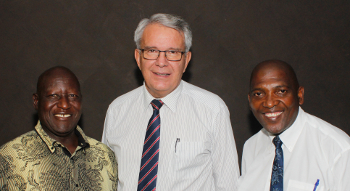Latest News Archive
Please select Category, Year, and then Month to display items
25 March 2024
|
Story Anthony Mthembu
|
Photo Lutendo Mabata
 Prof Nompumelelo Zondi, the newly appointed Vice-Dean: Research and Postgraduate Studies in the Faculty of The Humanities at the University of the Free State (UFS).
Prof Nompumelelo Zondi, the newly appointed Vice-Dean: Research and Postgraduate Studies in the Faculty of The Humanities at the University of the Free State (UFS).
Prof Nompumelelo Zondi has been appointed as Vice-Dean: Research and Postgraduate Studies in the Faculty of The Humanities at the University of the Free State (UFS). Prof Zondi assumed this new role on 1 March 2024 after serving as the Head of Department for African Languages at the University of Pretoria for seven years. “I consider this appointment as an opportunity of growth and learning more about higher education and the Faculty of The Humanities at large,” she said.
Prof Zondi indicates that part of her role is to spearhead the UFS Vision130 within the Faculty of The Humanities, and to ensure that the faculty assists the institution in becoming research-led, student-centred, and globally impactful.
Motivation for assuming this role
One of the primary reasons that led her to consider this role is sharing the knowledge she acquired as part of the Fulbright South African Research Scholar Programme. As a result of that experience and exposure, which went beyond the Ohio State University, she felt it befitting to implement some of the insights she acquired on a bigger scale. Therefore, even though she was impactful in her previous role, Prof Zondi believes that this is an exceptional and more desirable platform to do so. “I feel that I will have easier access to departments within the faculty, while also encouraging and supporting interdepartmental and faculty collaborations,” she explained.
A significant component of Vision 130
He believes that the elements that make up Vision 130 are interrelated. While she considers research central to Vision 130 – as she begins her journey at the UFS, she feels students deserve to be nurtured to further contribute to the university’s impactful research. Thus, student-centredness is the way to go. “I believe that students must be major role players in this Vision130; we must include them in the interactions and discussions that are part of the university’s strategic plan as well as in decision-making processes,” she said. As such, according to Prof Zondi, the more the faculty and the institution care for the students and involve them in Vision130 and in collaborations, the more research outputs the university will achieve.
New developments in the Faculty of Theology and Religion
2017-08-30

Bishop JM Khumalo, Apostolic Church of
Christ; Prof Fanie Snyman, Dean of the
Faculty of Theology and Religion; and
Rev Simon Galada, Wesleyan Church,
at the faculty’s official opening in
February 2017.
Photo: Eugene Seegers
At a meeting of the UFS Council last year, a name change was accepted for the Faculty of Theology, renaming it to the Faculty of Theology and Religion. This change signals openness in approach to other religions, in addition to those of Christian denominations. This is a development that took root in Europe a few years ago. Furthermore, a growing field of interest is the study of the impact religion has had and still has, even in highly secularised societies. This name change is the first of its kind in South Africa, which means that the faculty will lead the way in transformation and impact-based religious studies.
Exciting times lie ahead
Prof Fanie Snyman, Dean of the faculty, says of these refinements: “The new name and restructuring of departments will lead to a new synergy that will have an impact on our teaching and research in the faculty. Exciting times lie ahead for the Faculty of Theology and Religion!”
Apart from the change in the name of the faculty, departments within the faculty were also regrouped, with new names. The Departments of Old Testament and New Testament merged to become the Department of Old and New Testament Studies, while the Departments of Systematic Theology and Ecclesiology merged and will now be known as the Department of Historical and Constructive Theology. The former Departments of Practical Theology and Missiology became the Department of Practical and Missional Theology. The Department of Religion Studies remained unchanged to emphasise the importance of religion in South Africa and the world at large.
Error! Hyperlink reference not valid.
Distinction of theological disciplines
The rationale for these groupings is the distinction of theological disciplines in terms of the study of texts (Old and New Testament), sources (Systematic Theology and Church History), and practices (Practical Theology and Missiology). One benefit of these newly-constructed departments is that they will be more cost-effective, but the more important advantage is that this will stimulate discussion and research across the various theological disciplines.